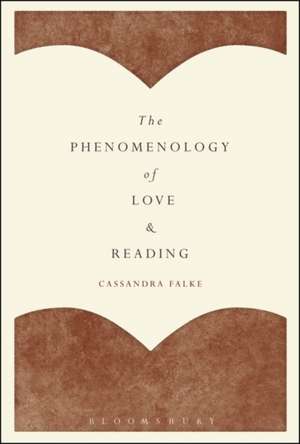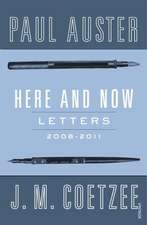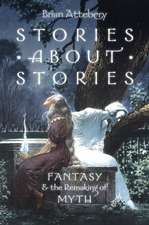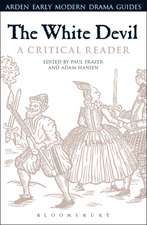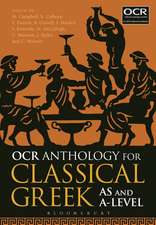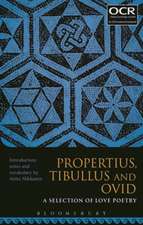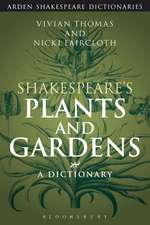The Phenomenology of Love and Reading
Autor Professor Cassandra Falkeen Limba Engleză Hardback – 16 noi 2016
| Toate formatele și edițiile | Preț | Express |
|---|---|---|
| Paperback (1) | 235.54 lei 6-8 săpt. | |
| Bloomsbury Publishing – 30 mai 2018 | 235.54 lei 6-8 săpt. | |
| Hardback (1) | 713.72 lei 6-8 săpt. | |
| Bloomsbury Publishing – 16 noi 2016 | 713.72 lei 6-8 săpt. |
Preț: 713.72 lei
Preț vechi: 1027.16 lei
-31% Nou
Puncte Express: 1071
Preț estimativ în valută:
136.57€ • 142.97$ • 113.00£
136.57€ • 142.97$ • 113.00£
Carte tipărită la comandă
Livrare economică 05-19 aprilie
Preluare comenzi: 021 569.72.76
Specificații
ISBN-13: 9781628926484
ISBN-10: 1628926481
Pagini: 192
Dimensiuni: 152 x 229 x 13 mm
Greutate: 0.43 kg
Editura: Bloomsbury Publishing
Colecția Bloomsbury Academic
Locul publicării:New York, United States
ISBN-10: 1628926481
Pagini: 192
Dimensiuni: 152 x 229 x 13 mm
Greutate: 0.43 kg
Editura: Bloomsbury Publishing
Colecția Bloomsbury Academic
Locul publicării:New York, United States
Caracteristici
Juxtaposes
North
American
cognitive
approaches
to
literature
and
European
philosophical
reflections
on
love
Notă biografică
Cassandra
Falkeis
Professor
of
English
Literature
and
Culture
at
the
University
of
Tromsø,
Norway.
Her
previous
books
include
Literature
by
the
Working
Class:
English
Autobiography,
1820-1848
(2013)
and,
as
editor,Intersections
in
Christianity
and
Critical
Theory(2010).
She
has
also
published
articles
about
English
Romanticism,
literary
theory,
and
liberal
arts
education.
Cuprins
Introduction1
Phenomenology
and
Literature2
The
Erotic
Reduction3
The
Lover's
AdvanceInterlude4
Empathy5
Attention6
Being
OverwhelmedConclusionBibliography
Index
Recenzii
To
write
on
phenomenology
and
literature
requires
an
author
who
reads
with
exacting
delicacy
and
who
construes
demanding
philosophy
with
a
high
level
of
clarity.
Cassandra
Falke
is
just
this
person.The
Phenomenology
of
Love
and
Readingis
a
book
of
twofold
significance:
at
once
an
invitation
to
read
literature
with
Jean-Luc
Marion,
eminent
phenomenologist
of
love,
and
a
study
of
what
is
involved
when
we
read-reallyread-narrative
fiction
and
poetry.
In order for we readers to know a literary text on its own, multiple terms, our love has to be in play: this is the key insight that Cassandra Falke develops in this clearly written, illuminating, and extraordinarily wise book. Through a series of incisive chapters that unfold Jean-Luc Marion's rich phenomenology of love in relation to the historical features of the phenomenological method, various phenomenologies of reading, and contemporary literary theory, Falke persuasively offers not only an argument for but a performance of what she terms "charitable reading": an approach to reading characterized by specifically "erotic" modes of receptivity and attention to the literary text's burgeoning givenness. Falke shows how and why the loving reader's experiences with the text's phenomenality form the way he or she encounters embodied persons outside the text, such that erotic reading becomes a pedagogy of love. Falke's book invites us to understand nothing less than how the knowing we achieve through loving reading is integral to the loving relations that constitute the very flesh and blood of our lives.
One of the professed goals of this work is to bring the theology of French philosopher Jean-Luc Marion (b. 1946) together with literary criticism. Marion is an important thinker in the phenomenological tradition, and in recent times he has become one of the leading voices in contemporary theology. But until now the relevance of Marion's work had not reached the field of literary theory, and this book attempts to forge that connection. Falke (English literature and culture, Univ. of Tromsø, Norway) focuses on the theme of love, which, according to Marion, takes precedence over all other experiences. In the introduction the author writes that "criticism should itself be an act of love"; indeed, it should not be separate from the rest of life, and it should add something to the world. This is because literature expands one, and books provide an "elsewhere" that takes the reader away from ordinary self-possession. And so, it seems, one can cultivate the capacity for love through reading that enhances love's virtues, including attention, empathy, and a willingness to be overwhelmed. Falke reflects thoughtfully on the phenomenology of reading, and shows the relevance of Marion's claim that "erotic reduction" is the key to who one is. Summing Up: Recommended.
For Falke-love is a submission of the ego to the other, not in submitting to the domination by the other, but in putting aside one's ego desires, and opening one's self to becoming changed by the other-whether or not the other reciprocates the love . That in short form is the challenge Falke poses to the reader of her book: allow at least the literary book, if not the theoretical and argumentative book, for the most part, to change your inner self, rather than coming to the book with a sense of a need to control, own, and dominate. Moreover, not only does Falke construct a theoretical structure for developing her thesis of reading as erotic love, as a form of allowing the book to speak to you in its own terms, from its own frame of reference, Falke also, provides a practicum for how to perform the erotic reduction of a text . The adoption of erotic reduction is a logical necessity, even when psychologically difficult, if our goal is to getinside the mind of the book, as it were.
Falke's book reaffirmed my conviction of the high aesthetic significance of Marion's phenomenology. Exemplary are the lovely pages she devotes to Marion's discovery of everyday life's richness ... Phenomenology conjoins art and life-this is Falke's chief, invaluable insight.
In order for we readers to know a literary text on its own, multiple terms, our love has to be in play: this is the key insight that Cassandra Falke develops in this clearly written, illuminating, and extraordinarily wise book. Through a series of incisive chapters that unfold Jean-Luc Marion's rich phenomenology of love in relation to the historical features of the phenomenological method, various phenomenologies of reading, and contemporary literary theory, Falke persuasively offers not only an argument for but a performance of what she terms "charitable reading": an approach to reading characterized by specifically "erotic" modes of receptivity and attention to the literary text's burgeoning givenness. Falke shows how and why the loving reader's experiences with the text's phenomenality form the way he or she encounters embodied persons outside the text, such that erotic reading becomes a pedagogy of love. Falke's book invites us to understand nothing less than how the knowing we achieve through loving reading is integral to the loving relations that constitute the very flesh and blood of our lives.
One of the professed goals of this work is to bring the theology of French philosopher Jean-Luc Marion (b. 1946) together with literary criticism. Marion is an important thinker in the phenomenological tradition, and in recent times he has become one of the leading voices in contemporary theology. But until now the relevance of Marion's work had not reached the field of literary theory, and this book attempts to forge that connection. Falke (English literature and culture, Univ. of Tromsø, Norway) focuses on the theme of love, which, according to Marion, takes precedence over all other experiences. In the introduction the author writes that "criticism should itself be an act of love"; indeed, it should not be separate from the rest of life, and it should add something to the world. This is because literature expands one, and books provide an "elsewhere" that takes the reader away from ordinary self-possession. And so, it seems, one can cultivate the capacity for love through reading that enhances love's virtues, including attention, empathy, and a willingness to be overwhelmed. Falke reflects thoughtfully on the phenomenology of reading, and shows the relevance of Marion's claim that "erotic reduction" is the key to who one is. Summing Up: Recommended.
For Falke-love is a submission of the ego to the other, not in submitting to the domination by the other, but in putting aside one's ego desires, and opening one's self to becoming changed by the other-whether or not the other reciprocates the love . That in short form is the challenge Falke poses to the reader of her book: allow at least the literary book, if not the theoretical and argumentative book, for the most part, to change your inner self, rather than coming to the book with a sense of a need to control, own, and dominate. Moreover, not only does Falke construct a theoretical structure for developing her thesis of reading as erotic love, as a form of allowing the book to speak to you in its own terms, from its own frame of reference, Falke also, provides a practicum for how to perform the erotic reduction of a text . The adoption of erotic reduction is a logical necessity, even when psychologically difficult, if our goal is to getinside the mind of the book, as it were.
Falke's book reaffirmed my conviction of the high aesthetic significance of Marion's phenomenology. Exemplary are the lovely pages she devotes to Marion's discovery of everyday life's richness ... Phenomenology conjoins art and life-this is Falke's chief, invaluable insight.
